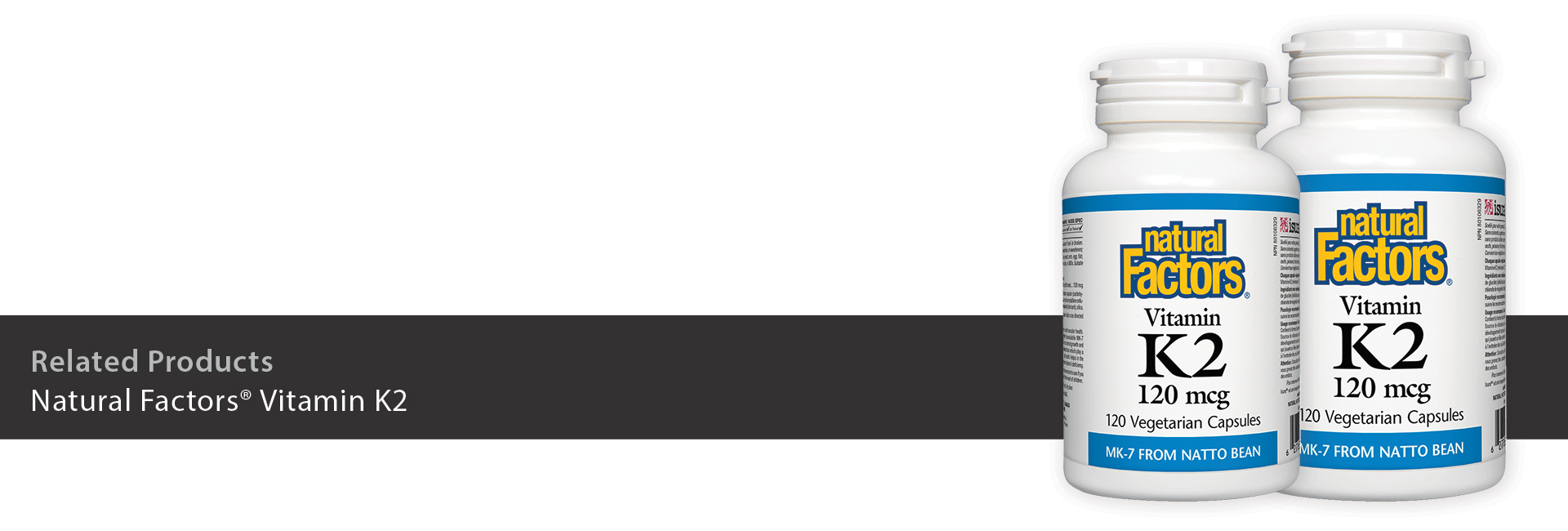

What We Need to Know About Vitamin K2
Vitamin K2 (menaquinone) is an interesting conversation starter. The fact is that it doesn’t get the press it deserves, as many people don’t really know how it helps us or how vital it is. Our bodies don’t generate this vital nutrient, and we tend not to get enough of it in our diet.
The vitamin K family consists of vitamin K1 (phylloquinone), K2 (menaquinone), and K3, a synthetic form of the vitamin. K3 has been shown to have a toxic effect on the liver, so it’s not optimal. K1 is plentiful in green leafy vegetables but does not convert to enough vitamin K2 in our intestines in order to help with atherosclerosis (hardening of the arteries) or osteoporosis.
Natural Factors Vitamin K2 contains MK-7, an advanced form of vitamin K that serves multiple functions in the body. Vitamin K2 plays a critical role in protecting the heart as well as building strong bones. Calcium is integral to bone and teeth health yet can clog arteries and other soft tissues. Vitamin K2’s role is essential to prevent blood clotting and guide calcium toward the bones and teeth where it is most needed. At the same time, it keeps calcium away from tissues and arteries where it could have negative effects, such as calcification, which can contribute to atherosclerosis.
MK-7 is the most bioavailable form of vitamin K2 and is derived naturally from natto beans. Natto is a fermented soybean food popular in Japan, but hasn’t been adopted among westerners because it has a very distinct taste. K2 is also available in butter, grass-fed meats, organ meats, and egg yolks. Still, as most people cannot meet the daily requirement for K2, it is best to supplement. The MK-7 form has also been shown to offer 24-hour protection in a single dose, versus other commercially available supplements that tend to only last 4–6 hours in the body.
The need to direct calcium to bones and teeth and away from soft tissues and arteries is necessary as we age and the potential diagnosis of osteoporosis looms, especially among older women. Coupled with the increased risk of fractures as we get older, osteoporosis is a growing problem in Western countries.
Osteoporosis literally means “porous bone.” Normal healthy bone looks like a honeycomb, but bone with osteoporosis reveals much larger holes and shards of bone, which is why it is prone to breaking much more easily. While it’s true that bone density loss cannot be reversed, with proper treatment and supplementation, osteoporosis can be slowed down significantly if caught early enough.
Anyone concerned with their bone and teeth health should consider supplementing with Natural Factors Vitamin K2. We can also incorporate more soft-ripened cheeses and fermented foods in our diets, such as sauerkraut, kombucha, and kimchi, which have other positive effects on gut flora as well.

